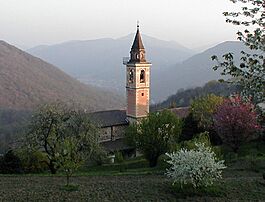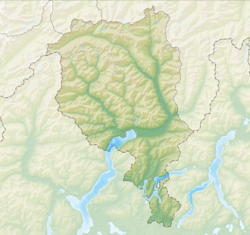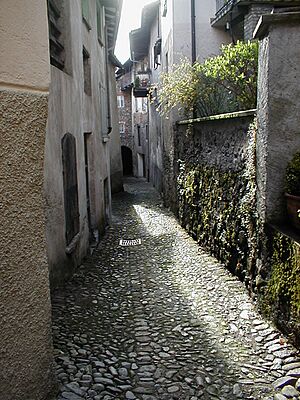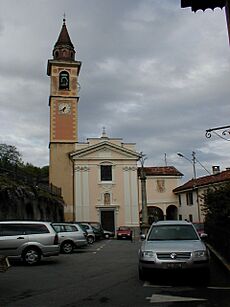Bedigliora facts for kids
Quick facts for kids
Bedigliora
|
||
|---|---|---|

Bedigliora village church
|
||
|
||
| Country | Switzerland | |
| Canton | Ticino | |
| District | Lugano | |
| Area | ||
| • Total | 2.57 km2 (0.99 sq mi) | |
| Elevation | 617 m (2,024 ft) | |
| Population
(Dec 2020 )
|
||
| • Total | 604 | |
| • Density | 235.0/km2 (608.7/sq mi) | |
| Postal code |
6981
|
|
| Surrounded by | Croglio, Curio, Novaggio, Pura, Sessa | |
Bedigliora is a charming village located in the Ticino region of Switzerland. It's part of the Lugano district and is known for its beautiful scenery and quiet life. This small municipality is a great example of a traditional Swiss village.
Contents
- Discovering Bedigliora's Past: A Look at Its History
- Exploring Bedigliora's Landscape: Geography and Nature
- Understanding Bedigliora's Symbol: The Coat of Arms
- People of Bedigliora: Demographics and Population
- Special Places: Bedigliora's Heritage Sites
- Working in Bedigliora: Economy and Jobs
- Faith in Bedigliora: Religion
- Learning in Bedigliora: Education System
- See also
Discovering Bedigliora's Past: A Look at Its History
Bedigliora has a long and interesting history. It was first mentioned in official records way back in 1335. Another nearby settlement, Banco, appeared in records in 1421.
Ancient Times: Early Settlements in Bedigliora
People have lived in this area for a very long time. Archeologists have found tools like an ax from the Neolithic era (New Stone Age). They also found tombs from the Iron Age, showing ancient burials. A special stone slab called a stele with old Etruscan writing was also discovered.
Medieval Period: Bedigliora's Role in the Middle Ages
During the Middle Ages, Bedigliora, Banco, Curio, and Novaggio formed a special group called a Kastlanei. This was like a small local government area.
Religious Buildings: Churches and Parishes
The Church of St. Roch was built in 1644, but it replaced an even older chapel. The church of San Salvatore in Banco is also very old, dating back to the Middle Ages. It used to be the main religious and community center for the Kastlanei. In 1612, Bedigliora became the main church area, known as the parish church.
Modern Changes: Commuting and Community Life
In the past, many people from Bedigliora would temporarily leave to find work. Today, most residents travel to jobs in other towns, especially Lugano. By 1990, about two-thirds of the people living here commuted for work. Bedigliora also has its own primary and secondary schools for local students.
Exploring Bedigliora's Landscape: Geography and Nature
Bedigliora covers an area of about 2.48 square kilometers (about 1 square mile). A big part of this land is covered by forests.
Land Use: How Bedigliora's Land is Used
About 17.7% of the land is used for farming, growing crops or for pastures. A large portion, about 77%, is covered by forests. The remaining land, about 13.3%, has buildings and roads. Most of the built-up area is homes and other buildings.
Location and Villages: Where is Bedigliora?
The municipality is located in the Lugano district. It sits on the southern side of Monte Bedeglia, in a valley called Malcantone. Bedigliora includes the main village and smaller settlements called hamlets. These hamlets are Nerocco, Beride, and Banco.
Understanding Bedigliora's Symbol: The Coat of Arms
Every town has a special symbol called a coat of arms. Bedigliora's coat of arms is divided into two parts.
Symbols Explained: Nail and Owl
On one side, it shows a silver nail on a red background. On the other side, it has a black owl on a gold background. The nail (called chiodo in Italian) and the owl (called alloco in Italian) are linked to old nicknames for the people from Bedigliora and Banco.
People of Bedigliora: Demographics and Population
Bedigliora has a population of about 600 people. In 2008, about 9.1% of the people living there were foreign nationals. Over ten years (1997–2007), the population grew by about 17.5%.
Languages Spoken: What Languages Do People Speak?
Most people in Bedigliora speak Italian, which is about 85.2% of the population. The second most common language is German, spoken by about 10.2% of residents. A smaller number of people, about 1.9%, speak French.
Population Changes: How the Number of Residents Changes
In 2008, there were slightly more women (52.4%) than men (47.6%) living in Bedigliora. The population changes each year due to births, deaths, and people moving in or out.
Age Groups: Who Lives in Bedigliora?
The population includes people of all ages. In 2009, about 9.5% were children under 9 years old, and 13.8% were teenagers between 10 and 19. Adults aged 40-49 made up the largest group, at 21.3%. There are also many senior citizens, with about 20.4% of the population being over 60 years old.
Homes and Households: How People Live
In 2000, there were 233 private homes in Bedigliora, with about 2.3 people living in each home on average. Most of these homes were single-family houses.
Historical Population: Looking Back at Numbers
The number of people living in Bedigliora has changed over time. Here's a quick look:
| year | population |
|---|---|
| 1591 | 420 |
| 1696 | 517 |
| 1801 | 500 |
| 1850 | 499 |
| 1900 | 495 |
| 1950 | 344 |
| 1960 | 314 |
| 1990 | 399 |
| 2000 | 540 |
Special Places: Bedigliora's Heritage Sites
The entire village of Bedigliora is recognized as a special place. It is part of the Inventory of Swiss Heritage Sites. This means it has important historical or cultural value that should be protected.
Working in Bedigliora: Economy and Jobs
In 2007, the unemployment rate in Bedigliora was low, at 3.31%. This means most people who wanted jobs had them.
Types of Jobs: What Do People Do?
People in Bedigliora work in different areas. Some work in the primary sector, like farming. Others work in the secondary sector, which includes manufacturing. The largest number of jobs are in the tertiary sector, which includes services like shops, offices, and tourism.
Commuting to Work: Where Do People Go?
Many people who live in Bedigliora travel to other towns for work. In 2000, 175 residents commuted out of the municipality, while only 55 commuted in. Most people use a private car to get to work, while a smaller number use public transportation.
Faith in Bedigliora: Religion
According to the 2000 census, most people in Bedigliora are Roman Catholic, making up about 76.1% of the population. A smaller group, about 6.3%, belong to the Swiss Reformed Church. Some people belong to other churches, and a few did not state their religion.
Learning in Bedigliora: Education System
Education is important in Bedigliora. About 81% of adults (aged 25-64) have completed high school or gone on to higher education.
Schools in Bedigliora: From Kindergarten to Higher Learning
In 2009, there were 136 students in Bedigliora. The local education system offers different levels of schooling:
- Kindergarten: Children can attend up to three years of non-mandatory kindergarten.
- Primary School: This program lasts for five years.
- Lower Secondary School: After primary school, students can choose between a two-year middle school (followed by job training) or a four-year program to prepare for university.
- Upper Secondary School: This level prepares students for a trade or for university. Students can attend school full-time or part-time while doing an internship.
- Professional Programs: These programs last three years and prepare students for jobs in fields like engineering or nursing.
Student Movement: Where Students Learn
In 2000, many students from other towns came to Bedigliora for school. At the same time, a smaller number of Bedigliora residents went to schools outside the municipality.
See also
 In Spanish: Bedigliora para niños
In Spanish: Bedigliora para niños
 | Claudette Colvin |
 | Myrlie Evers-Williams |
 | Alberta Odell Jones |






